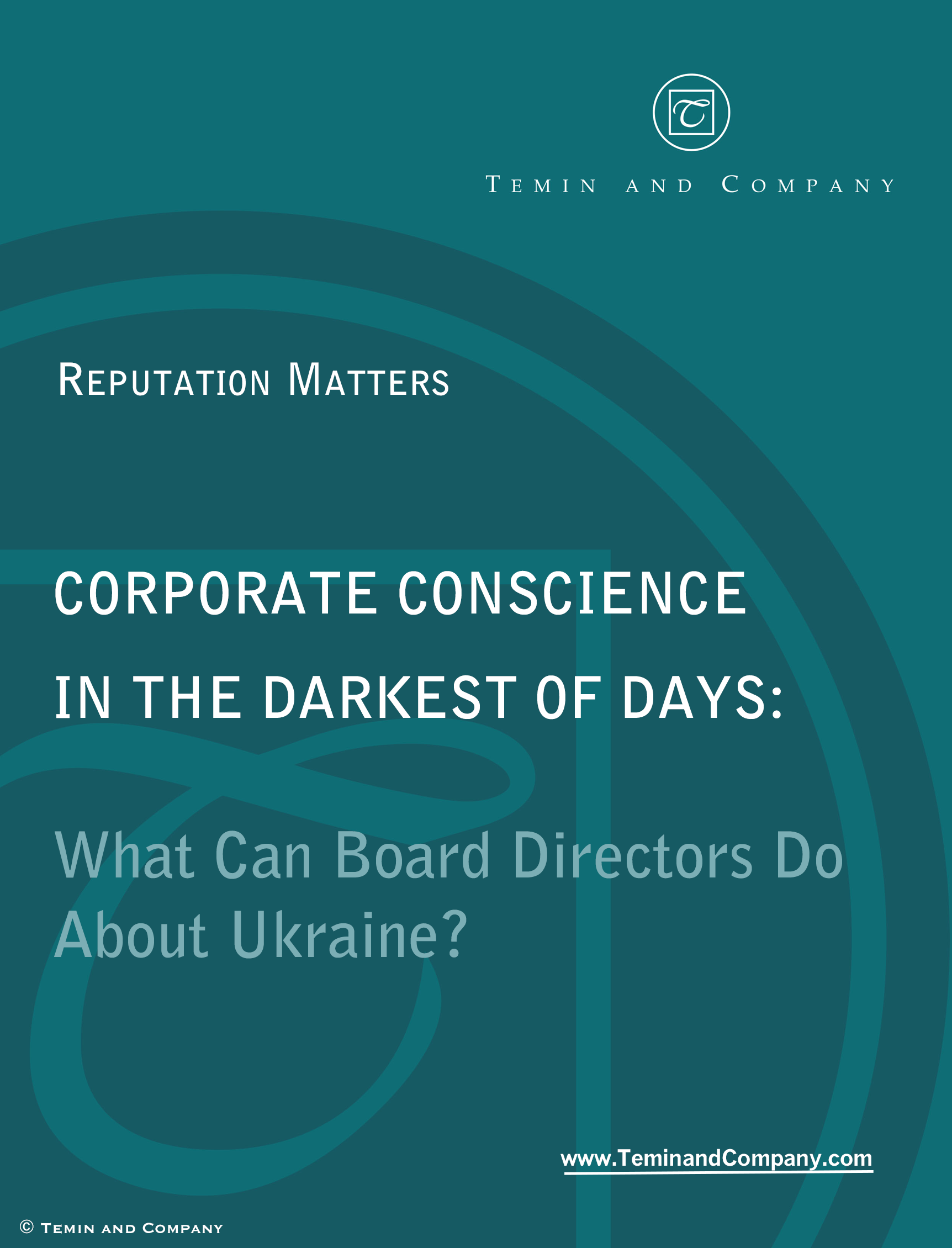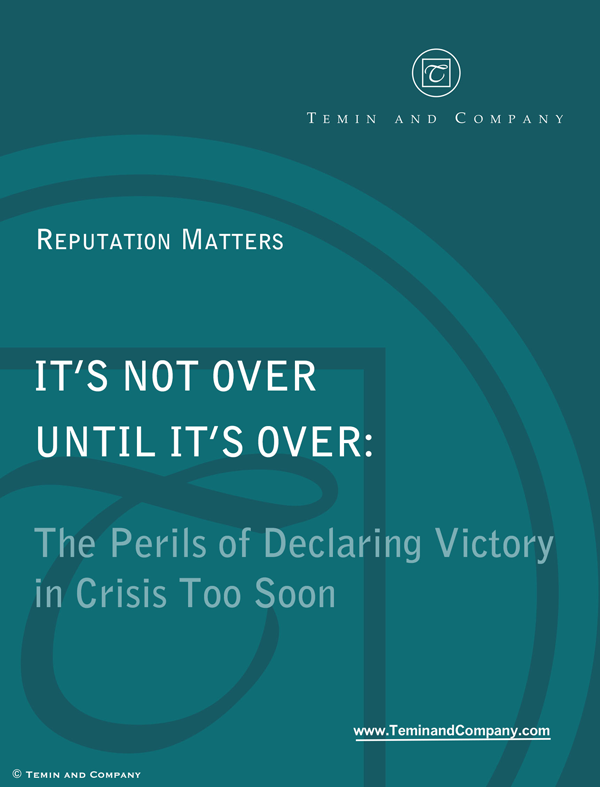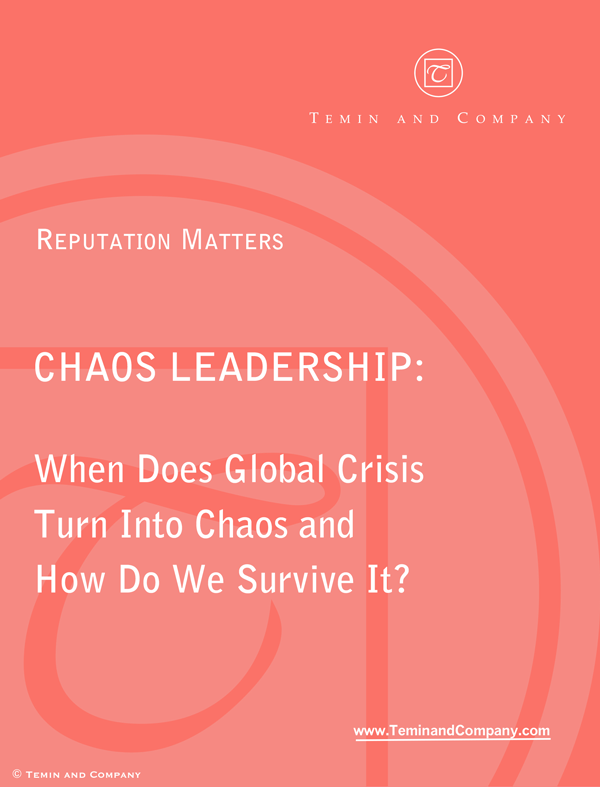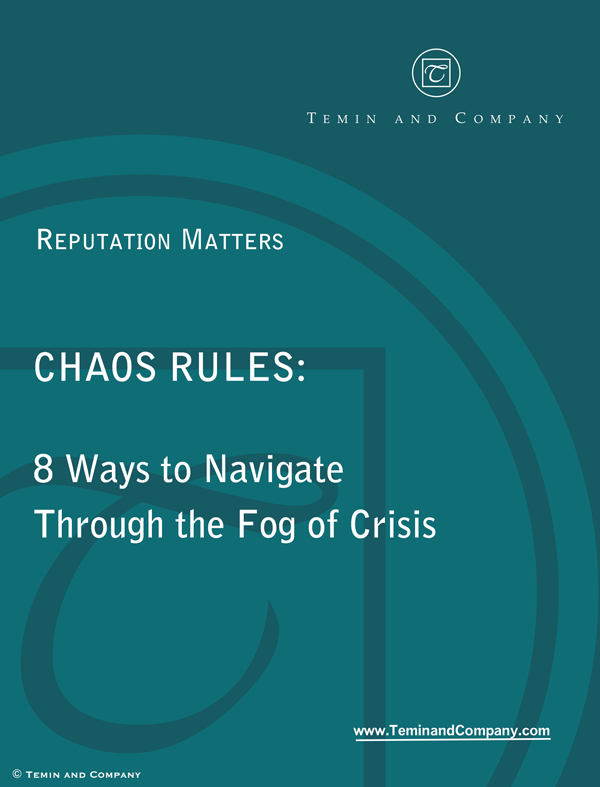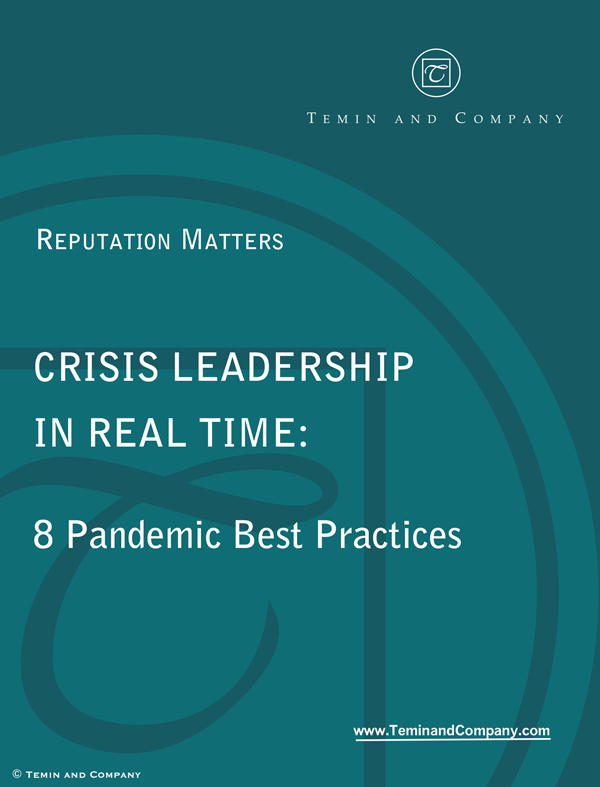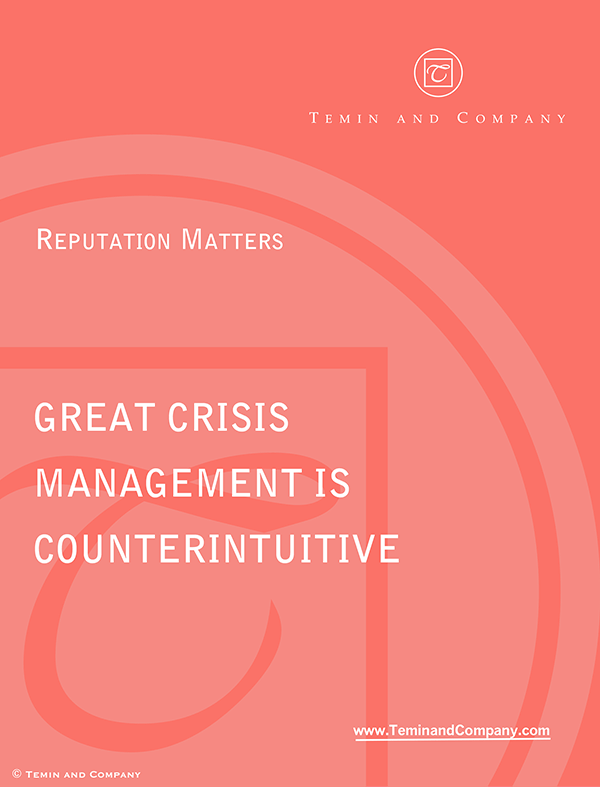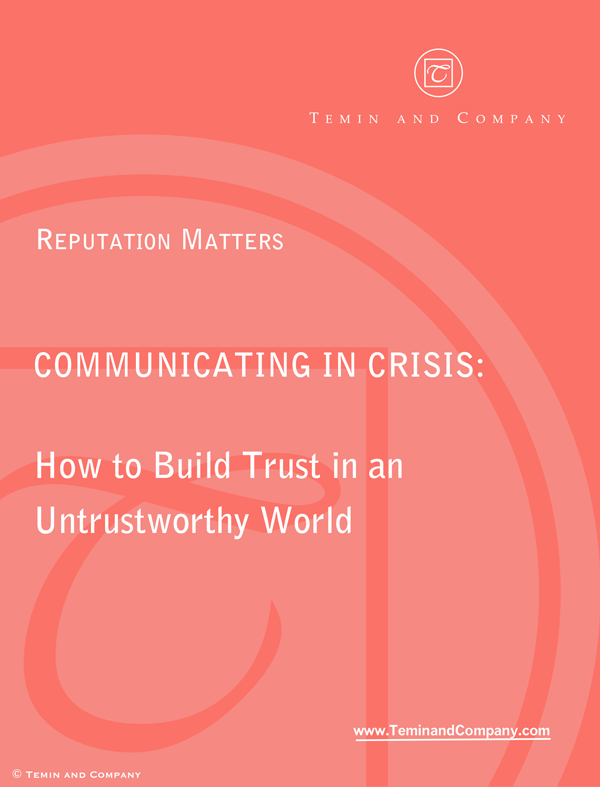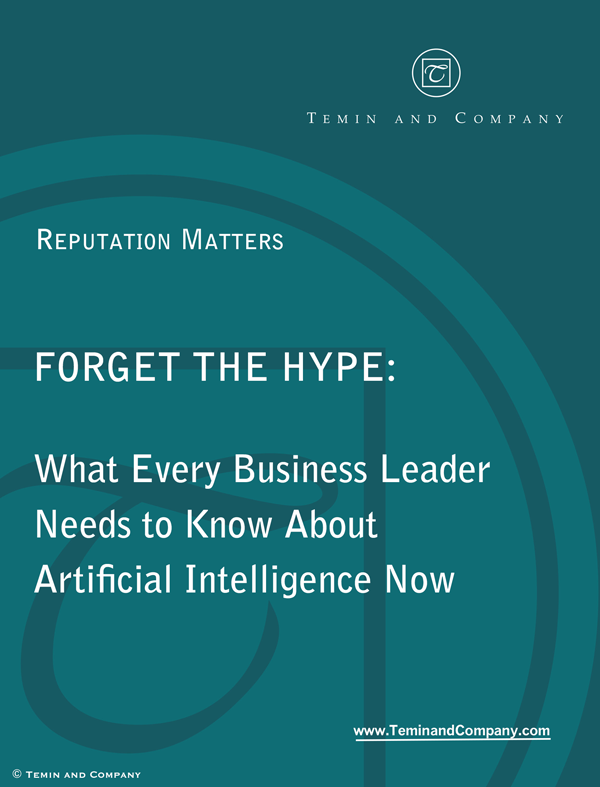Thought Leadership–Crisis Articles
White Papers»
"Reputation Matters" White Papers seek to offer deeper insight on a wide range of topics we help clients address.
A Tough Time To Ban Non-Competes
Leadership, “Reputation Matters,” Forbes, April 29, 2024

Trust in leaders is ebbing; job loyalty is tanking; service businesses are getting tougher; so are small businesses; competition is stiffening; interest rates continue to be high; and AI is putting everyone’s job at risk…
So, what is the FTC doing? Doing away with non-compete clauses—one of the few effective ways companies can protect their intellectual property, knowhow, and trade secrets in the Information Age, keeping American companies at the forefront of innovation.
By a vote of 3 to 2, The Federal Trade Commission issued its long-feared ban on non-compete agreements on April 23.
Non-competes may have been overused, but used well, they enable safe and profitable, high-level competition. Most entrepreneurs struggling to make a dent can appreciate this fact…while unfortunately, bureaucrats just may not understand. But they may see the fall-out from what is essentially a near-sighted decision. […read more]
Concentrate On Your Reputation, Not Brand — Brands Are For Products (and Cattle), Reputations Are For People
Leadership, “Reputation Matters,” Forbes, March 27, 2024

Most of us care about how the world sees and values us. Wise or foolish? Kind or cruel? Trustworthy? Hard-working? Brave? Leadership material or doomed to be an also-ran?
Unfortunately, while most would like to be in control of what people think of us, and our good names, most of the judgments regarding our fate are made in rooms where we are not present. So, what are they saying about us when we’re not in the room, and what can we do to influence it?
As the information landscape is more and more controlled by those bad actors who want to highjack the narrative, disinformation, AI-driven deep fakes, and incorrect data are in the ascendency. The “truth” about us — personally — is careening out of our control.
And the two ways we have had to address it — tending to our reputations that have been built up over a lifetime from the inside out, and building our “brands,” more superficial pictures of ourselves, controlled from the outside in — no longer seem to be fit for the challenge. […read more]
11 Attributes To Look For In Your Crisis Manager
Leadership, “Reputation Matters,” Forbes, January 16, 2024
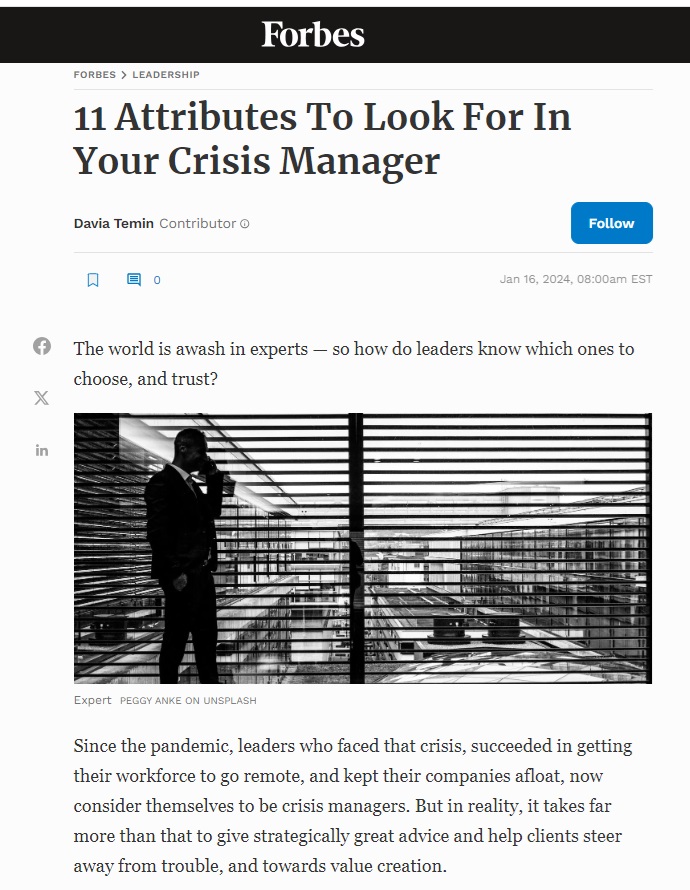
The world is awash in experts — so how do leaders know which ones to choose, and trust?
Since the pandemic, leaders who faced that crisis, succeeded in getting their workforce to go remote, and kept their companies afloat, now consider themselves to be crisis managers. But in reality, it takes far more than that to give strategically great advice and help clients steer away from trouble, and towards value creation.
In the first part of this two-part series we discussed how to judge judgment. After decades serving as a trusted strategy and crisis advisor to leaders in hundreds of different industries, settings, and situations, here are 11 stress-tested suggestions for how leaders can recognize whose advice to trust, and who to turn to in crisis. […read more]
Judging Judgment: How Can Leaders Know Whose Advice To Trust In Crisis Situations?
Leadership, “Reputation Matters,” Forbes, January 15, 2024
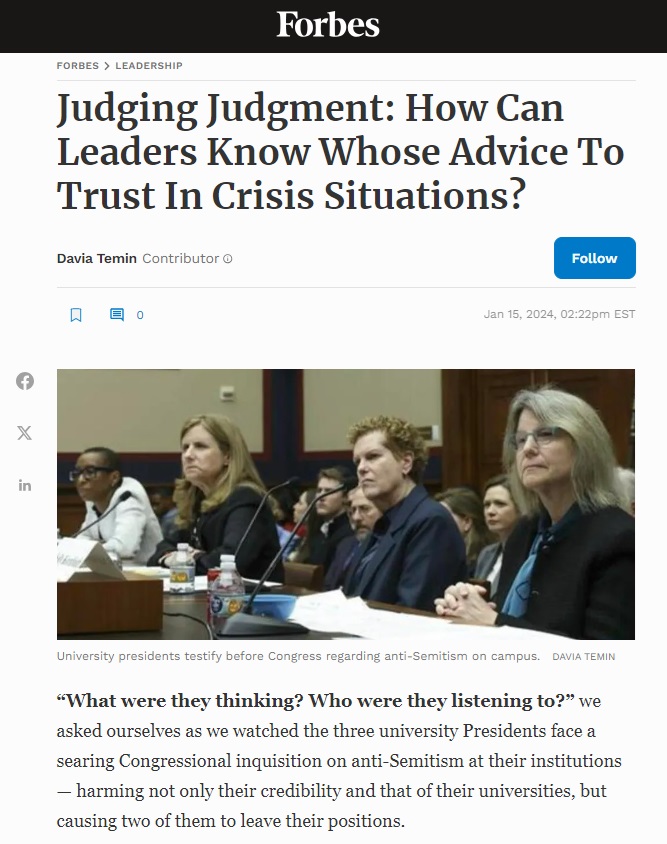
“What were they thinking? Who were they listening to?” we asked ourselves as we watched the three university Presidents face a searing Congressional inquisition on anti-Semitism at their institutions — harming not only their credibility and that of their universities, but causing two of them to leave their positions.
While the Presidents of MIT, University of Pennsylvania, and Harvard gave strong, elegant and convincing opening statements — all of which seemed strikingly similar — their advantage was dissipated during the questioning, which was notable for its toughness, but also for pushing the Presidents into a trap that was almost impossible to escape.
‘Yes or no’ they were told to answer by Representative Elise Stefanik, did the cries of “Intifada” on their campuses — taken to mean death to Israel and Jews — constitute bullying and harassment, and were thus against the rules of their universities?
The Presidents were basically asked the impossible question of the decade on college campuses — to choose between free speech and the banishment of hate speech that calls for violence. The question demanded strong, emotionally intelligent but institutionally decisive answers. And absolutely everyone knew that the question was coming. The need was for real answers, not verbal gamesmanship. Yet, the Presidents just were not prepared to answer the questions decisively and resonantly; they kept reverting back to the idea that there was no one answer — such bullying had to be taken “in context.” […read more]
The Nobel Prize Takes Aim Against Disinformation, Lies And Fakes
Leadership, “Reputation Matters,” Forbes, May 26, 2023
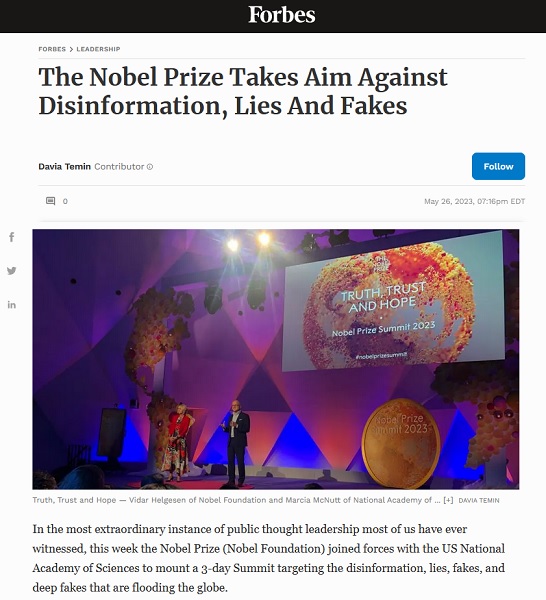
In the most extraordinary instance of public thought leadership most of us have ever witnessed, this week the Nobel Prize (Nobel Foundation) joined forces with the US National Academy of Sciences to mount a 3-day Summit targeting the disinformation, lies, fakes, and deep fakes that are flooding the globe.
The stakes could not be higher. From one-on-one ad hominem attacks, to the state-sponsored reputation destruction of political enemies, to the wholesale targeting of scientific findings, research and inquiry, disinformation campaigns are challenging our principles, truths — and souls. And, of course, social media and AI-enabled mimicry exacerbate the problem, putting our cognition more and more at risk. At their worst, they challenge our very understanding of reality, as well as our ability to trust anyone or anything.
Once there is no certainty to be found on the shifting sands of lies, trust dies a hard and ugly death.
So, who better to lead the charge than The Nobel Foundation and the National Academy of Sciences? In this three-day tour-de-force, titled “Truth, Trust and Hope,” they convened Nobel Prize laureates, notable experts, poets, artists, musicians, and even magicians to call out the problems caused by purposeful disinformation and truth destruction. […read more]
Corporate Conscience In The Darkest Of Days: What Can Board Directors Do About Ukraine?
Leadership, “Reputation Matters,” Forbes, March 11, 2022
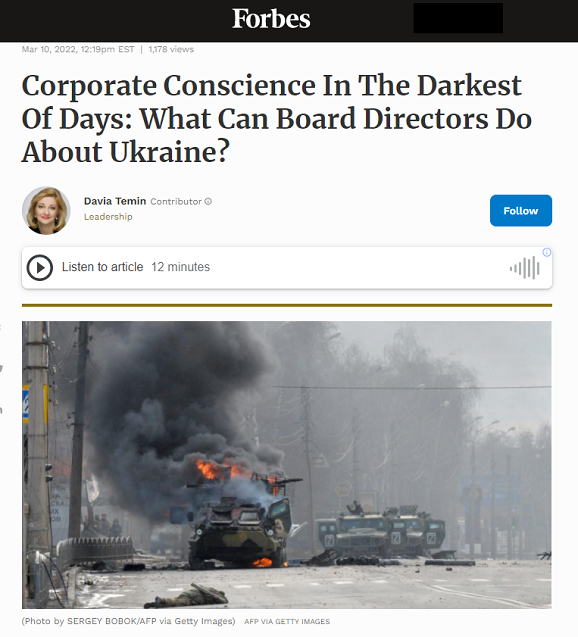
Over the years, the obligation organizations, their employees, customers, and stakeholders have felt to address — and redress — tragic wrongs in society has grown and grown.
Corporate social responsibility has been a topic for decades. But it is only now, as the concept of B corps (a designation that a business is meeting high standards of verified performance, accountability, and transparency) has intersected with the dereliction of various countries and their leaders to “do the right thing,” that companies have truly begun to find their voices. Often, they have needed to become the only adults in the room.
“#MeToo,” the murders of George Floyd and other black men and women caught on video, racism as a whole, atrocities at our border separating parents from their children, climate change and its devastating consequences, the importance of vaccines to fight the pandemic, and the pandemic itself — are all examples of controversial, politicized issues some corporations have begun to weigh in on.
Whether those issues directly involved the company or not, some leaders — management and board-level — chose to speak out. It is as if companies now not only have their own “brands” and “reputations,” they are developing their own personalities that they must stay true to: the company as global citizen. The corporate conscience. […read more]
Netflix CEO’s “Non-Apology Apology” Over Dave Chappelle Show Misses The Mark As Sarandos Struggles To Navigate Culture Wars
Leadership, “Reputation Matters,” Forbes, October 20, 2021

No one has ever said that being CEO was easy. And today, as the top leadership role has expanded to encompass “spinner-in-chief” — getting the message right becomes mission-critical.
But, as Netflix CEO Ted Sarandos is so publicly finding out, this is awfully hard to do, especially when you’ve placed yourself squarely in the middle of the culture wars.
And you know what, “Voice-of-God,” “from-the-mount” proclamations do not work so well anymore. Sensitivities are on high alert. Inclusion means that you really have to listen and be sensitive to diverse voices, even when you disagree. And you need to communicate to all of your key audiences orders of magnitude more than you ever had to before. So it’s hard. And the rules are changing fast. […read more]
Disney Ignites A Firestorm By Dissing Scarlett Johansson: How To Damage An Iconic Company Brand In One Move
Leadership, “Reputation Matters,” Forbes, August 1, 2021
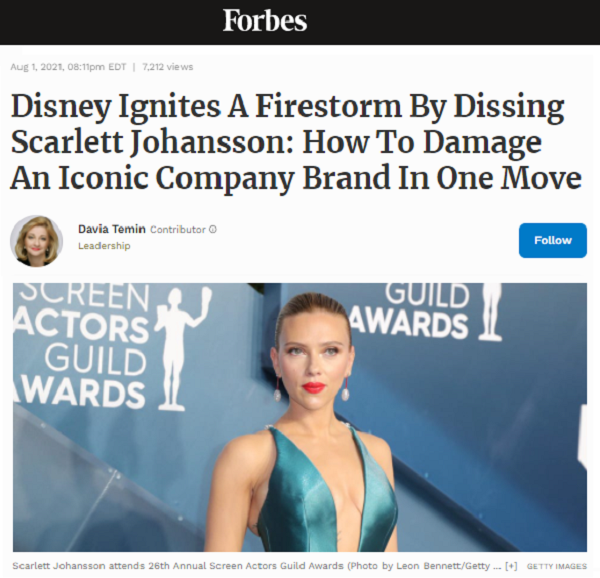
Disney just shocked the industry, movie goers, Marvel fans, Scarlett Johansson lovers, and media watchdogs alike with its unnecessary, nasty response to Johansson’s suit regarding “Black Widow’s” changed distribution plans.
Instead of taking the high road in their public response to what is essentially a business matter — albeit an important financial one — they decided to go low and go mean. And in so doing not only have they angered industry leaders like Johansson’s agents at CAA, action movie fans, and women’s rights advocates, they have seriously put a dent in their reputation with their “un-Disney-like,” off-brand behavior. Nasty, mean-spirited ad hominem attacks are just not what the public expects from Disney, or Marvel. These are supposed to be the good guys, after all. […read more]
It’s Not Over Until It’s Over: The Perils Of Declaring Victory In Crisis Too Soon
Leadership, “Reputation Matters,” Forbes, July 20, 2021
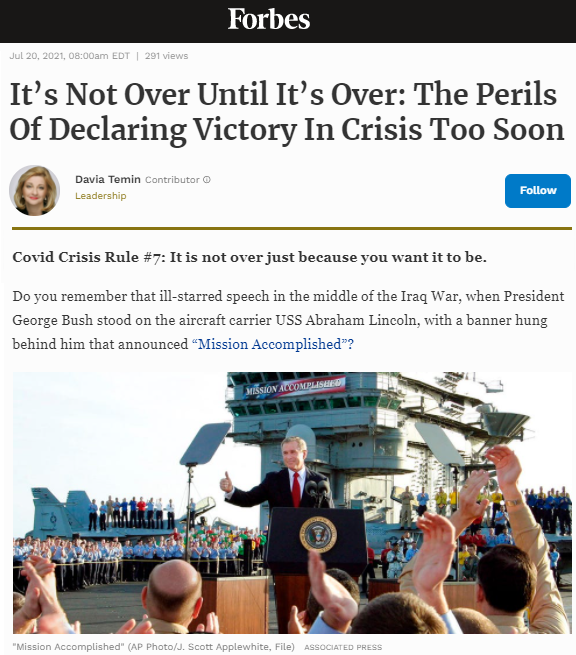
Covid Crisis Rule #7: It is not over just because you want it to be.
Do you remember that ill-starred speech in the middle of the Iraq War, when President George Bush stood on the aircraft carrier USS Abraham Lincoln, with a banner hung behind him that announced “Mission Accomplished”?
Of course, the mission had not been accomplished. In fact, guerrilla warfare escalated and the vast majority of casualties in the Iraq war occurred after the speech had already been given. The whole affair turned into a huge embarrassment that President Bush later called one of the bigger mistakes of his career.
It turned into a global symbol of the triumph of wishful thinking over the truth.
But the President wanted the war to be over; everyone did. There were indications that it was winding down. And frankly, the war that started as apparent revenge for 9/11 had become such a political hot potato that he needed it to be over. The ambiguity was simply insupportable politically and practically, and so everyone jumped on a lie as if it were a lifeline.
Sound familiar?
Of course, we are in the middle of making another such mistake, and it is a classic crisis management mistake that can hurt us even more: This pandemic is not over, and we pretend it is at our peril. […read more]
50+ Days Of “House Arrest” — What You Can Do To Feed Your Soul, Heal Your Spirit, Keep Hope Alive — And Save The Planet
Leadership, “Reputation Matters,” Forbes, May 5, 2020
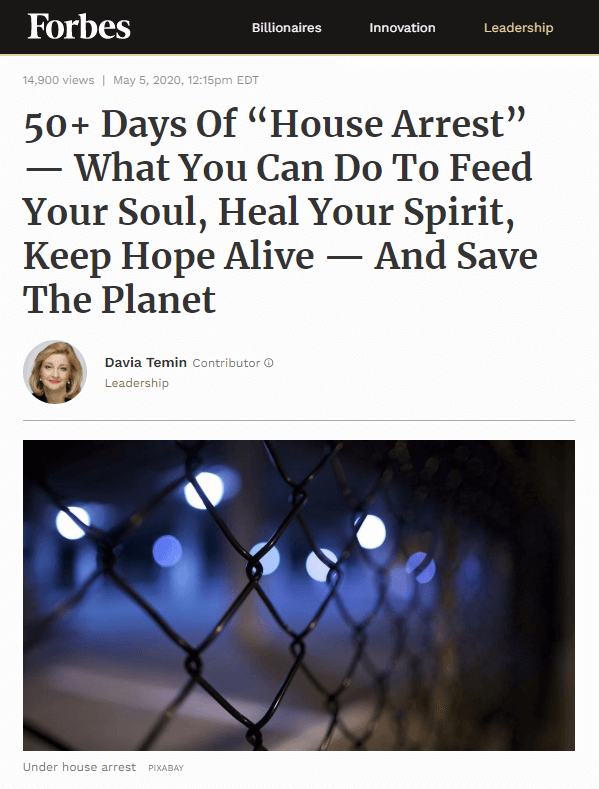
It’s been 50+ days now, give or take, since America has been sequestered at home. Whether you’re still on lock down, or beginning to plan a return to semi-normalcy; whether you’ve been sick, had loved ones sick, or are still worried about catching the virus and passing it along — for most this perpetual ambiguity we find ourselves in is not just getting old, it’s gotten ancient, unbearable.
Despair has set in for some, or is lurking fairly close for others. Spirits are flagging, souls are tried, and some have even begun to question their purpose and existence.
The globe’s dark night of the soul has gone on for two months, and though it may abate, there is no certain end in sight. Most of us feel relatively helpless. […read more]
White Papers»
"Reputation Matters" White Papers seek to offer deeper insight on a wide range of topics we help clients address.




